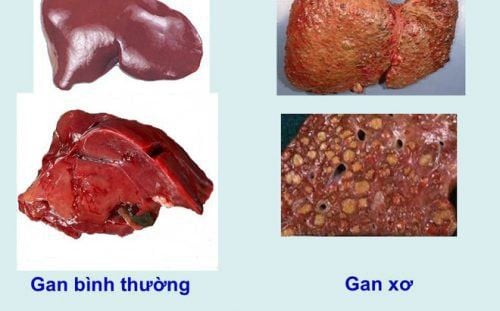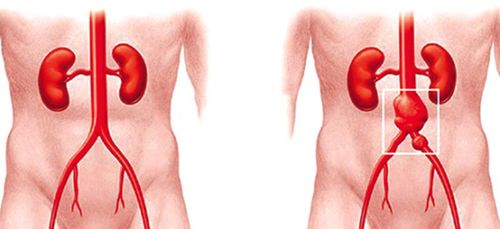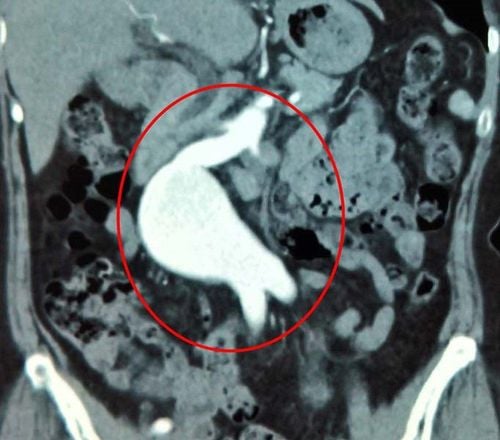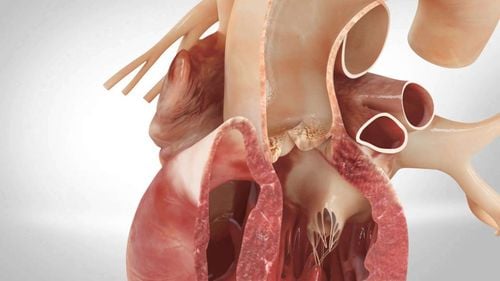This is an automatically translated article.
The article was professionally consulted by BSCK II Nguyen Quoc Viet - Interventional Cardiologist - Department of Medical Examination & Internal Medicine - Vinmec Danang International General Hospital.Abdominal aortic aneurysm is an abnormal focal dilation of the aorta in the abdomen, consisting of one or more segments. The mortality rate from ruptured abdominal aortic aneurysm is very high: 25% die before reaching the hospital and 51% die in the hospital without surgery.
1. Causes, frequency of occurrence and risk factors
The exact cause of abdominal aortic aneurysm is not known, the risk factors and favorable conditions for the formation of an abdominal aortic aneurysm are:High blood pressure Smoking Smoking Increased cholesterol, obesity Perforation Genetic factors Age, sex: Abdominal aortic aneurysms can form in anyone, but are most common in men over 60 years of age.
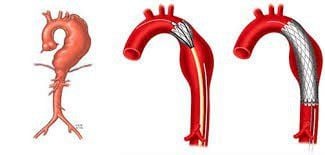
Some of the symptoms of an aneurysm rupture include:
Feeling of a pulse in the abdomen Pain in the abdomen or back - severe, sudden, persistent, or constant pain. Pain may radiate to the groin, buttocks and legs Stiff abdomen Anxiety Nausea and vomiting Sweating Heart palpitations standing Shock Abdominal mass.
2. Complications and risk of rupture of abdominal aortic aneurysm

Risk of cardiovascular collapse from ruptured aortic aneurysm: Blood loss and complications of ruptured abdominal aortic aneurysm can occur rapidly.
Retroperitoneal bleeding: may present with hematoma in the flank and inguinal region. Rupture into the peritoneal cavity can lead to abdominal distension, while rupture into the duodenum presents with massive gastrointestinal bleeding. Blood flow through the aneurysm will be disturbed and blood clots may form along the wall of the aorta. This blood clot, along with atherosclerotic fragments, can drift into the bloodstream causing embolism and affecting the circulation of the distal arteries.
Aneurysm dissection: sudden, severe pain, rapid pulse, low blood pressure, difficulty breathing.
Thromboembolism causing local embolism: Less commonly, an abdominal aortic aneurysm can cause a serious health problem called an embolism. Blood clots or debris can form inside the aneurysm and travel to blood vessels leading to other organs in the body. If one of these blood vessels becomes blocked, it can cause severe pain or even more serious problems, such as loss of a limb.
Because the abdominal aorta is the largest artery in the body, the circulation is very large and the aneurysm has a weak wall. On the other hand, the blood flow in the aneurysm segment is in the form of eddy flow, bouncing against the vessel wall, so it is easy to rupture, especially aneurysms > 5cm in diameter. When the aneurysm ruptures, the risk of death is very high, leaving many sequelae such as hypovolemic shock; arterial embolism; CKD; heart attack ; cerebrovascular accident.
3. Prevention and control of abdominal aortic aneurysm
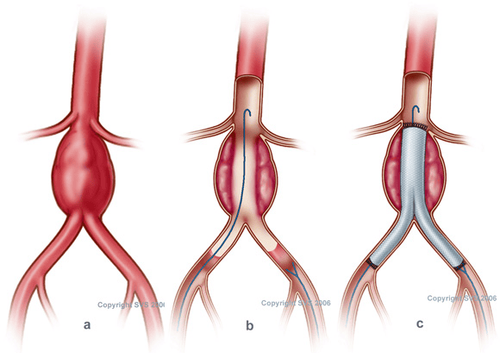
Some risk factors, such as age and genetics, cannot be controlled. However, other risk factors can be adjusted or controlled, which greatly reduces your chances of developing abdominal and other aortic aneurysms. Please control your risk factors by:
Don't smoke, drink alcohol Control blood pressure: High blood pressure is an important cause of vascular disease, you should maintain normal blood pressure by taking it. proper diet, stress management, stress or medication to control blood pressure Control your cholesterol levels: high cholesterol leads to atherosclerosis - one of the leading causes of aneurysms Owner Regular physical examination: Abdominal aortic aneurysm in the early stages most of the time has no symptoms, so regular health check-ups can detect the disease early. Especially people with a family history of abdominal aortic aneurysms, people over 60 years of age with a history of smoking or high blood pressure and high cholesterol, can be detected and treated early to prevent complications. and the risk of abdominal aortic aneurysm. Vinmec International General Hospital is the leading medical address for the diagnosis and treatment of aortic aneurysms. It has all the necessary medical equipment to perform simple to complex treatments such as medical treatment, stent-graft intervention, surgery... highly qualified, trained and certified technical, can handle quickly and effectively, especially in cases of urgent emergency. Therefore, patients with thoracic aortic aneurysms can rest assured with a strict, methodical and effective treatment process at Vinmec.
Doctor Nguyen Quoc Viet has more than 20 years of experience in the examination and treatment of cardiovascular diseases and Cardiovascular Interventions (Including angiography, dilation, stenting of coronary arteries, renal arteries...), placing temporary, permanent pacemaker... Before working at the Department of Medical Examination & Internal Medicine, Vinmec International General Hospital Da Nang, the doctor used to work for a long time at Da Nang Hospital.
Please dial HOTLINE for more information or register for an appointment HERE. Download MyVinmec app to make appointments faster and to manage your bookings easily.





